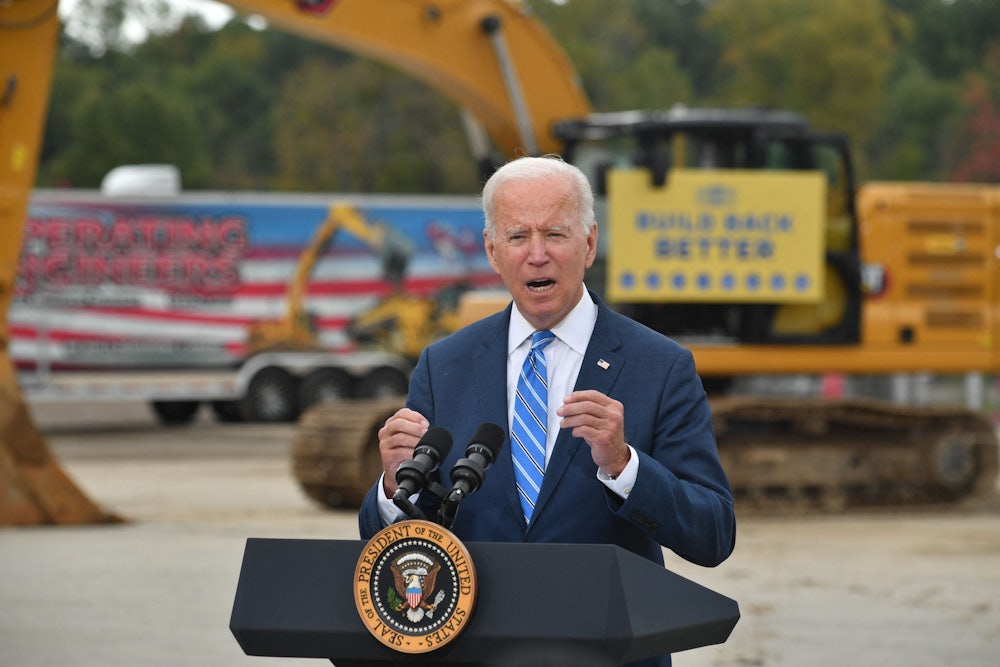There is little good news for Joe Biden in a recent poll in The Wall Street Journal that has the president neck and neck with Donald Trump in a hypothetical 2024 matchup. Indeed, the closeness of the 2024 race—a depressing reality that has long been clear—may be the least discouraging aspect of these numbers, which reveal that far more voters have concerns about Biden’s age than they do Trump’s, despite the fact that the latter is only three years older than the former. Roughly equal numbers believe that the two are “mentally up for the job”—though neither clears 50 percent.
Still, there is some reason for optimism on the Democratic side when it comes to age and competence. Despite being in the news (on account of being arrested several times), Trump has hardly been in the spotlight. He did not appear at the first presidential debate; he only recently started tweeting after a long hiatus (the result of using Twitter, now “X,” to attempt to overturn a legitimate election) to share a mug shot taken in Georgia late last month. There are good reasons to believe that when voters get a good look at Trump again, they will not like what they see: a deranged, diminished, and—it should be noted—much older figure than the man who ran in 2016.
Still, the most concerning aspect of the Wall Street Journal poll comes in how voters see Biden and Trump’s respective outlook and records. Slightly more than 50 percent believe that Trump “has a vision for the future,” whereas Biden barely clears 40 percent. Even more troubling is how the poll’s respondents view the two men’s respective presidencies: Roughly 50 percent believe Trump “has a strong record of accomplishments as president.” Only 40 percent think Biden does.
There have been attempts to dismiss the poll as a clever piece of ratfucking. Yes, one of the firms involved in it is on Donald Trump’s payroll. But another of the firms that participated has a long track record of working with Democratic politicians, including John Fetterman and Sherrod Brown. Its larger findings, both about the close state of the race and concerns about Biden’s advanced age, largely track with other polls. There’s no reason to discount its findings. The Biden campaign, in particular, should see them as a wake-up call.
Indeed, the most advantageous numbers for Democrats can be found on the calendar: We are still a very long way away from the 2024 election, and head-to-head polls at this early date are nondeterminative. Biden’s record of accomplishments as president is far stronger than Trump’s, and his vision is both clearer and less draconian. (In fact, the language of the poll does give Biden an out on the “vision” question—“has a vision for the future” is judgment-free. I would hardly contest that Trump has a vision of what he would like the country to look like under his rule, though I also find that chilling.)
It’s also not unlikely that voters’ economic outlook may be quite different a year from now. At the moment, 59 percent of voters disapprove of Biden’s handling of the economy, despite the fact that there are strong signs that the country has turned the corner on inflation, unemployment has stayed persistently low, and earlier concerns of a looming recession appear to have dissipated. If those trends continue, the public outlook may very well shift in in Biden’s favor, particularly as more of the projects funded by bills such as the Inflation Reduction Act kick into gear.
But banking on perceptions to shift naturally is foolish, if for no other reason that there is always the possibility that some exogenous event might alter our course. Gas prices, for instance, are currently rising, thanks to recent decisions by Saudi Arabia and Russia to curtail oil production. (Despite some speculation that these cuts are meant to hurt Biden and help Trump, this simply isn’t credible. For one thing, it’s too early for shifts in oil production to meaningfully affect anyone’s election odds. For another, both countries have plenty of internal reasons for shifting energy production.)
In any case, Biden has a strong record of economic stewardship—avoiding recession, managing inflation—and one of economic accomplishment, particularly on the legislative front. The infrastructure bill and Inflation Reduction Act both boosted the economy without worsening inflation—even if it is far too early to say if the latter actually reduced it. As we roll into next year, Biden will have plenty of projects he can stand in front of and trumpet his economic record.
Even if voters don’t come around on the economy, they will likely shift their perception in one key area. At the moment, the presidential race has hardly begun; Trump and Biden are not yet in competition with one another. When that competition kicks off, it will color perceptions: a stark choice between two candidates will be front of mind for the public and given the results of the 2020 presidential election and the most recent midterms, in which Trump was a massive drag on GOP electoral ambitions, it’s not unreasonable to think that contrast will aid Biden’s fortunes.
Trump has long pointed to the success of the stock market under his presidency—conveniently omitting the post-Covid dip—as a kind of alternate approval rating. But gains in the stock market largely went to the wealthy. His signature—and indeed only meaningful—legislative accomplishment was a bill that axed the corporate tax rate, kicked off a corporate stock buyback bonanza, and ballooned the deficit. Though still imperfect, thanks in part to his administration’s reluctance to take more aggressive measures on student loan forgiveness, Biden’s economic record is both strong and far more equitable. He can point to increased labor protections, a low unemployment rate, and to legislation aimed at paying workers, not lining the pockets of executives.
This also gets to a larger, and still largely overlooked, key to defeating Donald Trump. Democrats rightly see Trump as a dangerous aberration, a darkly authoritative and abnormal figure who is intent on subverting—and indeed destroying—American democracy at every turn. This is true, but there’s also good reason to believe that demystifying Trump as some sort of economic populist is as important, if not more important, when it comes to defeating him. Economically speaking, Trump largely acted as a bog-standard Republican, cutting taxes, weakening worker protections, benefiting the wealthy and corporations at every turn. For all of his abnormalities—and with the exception of a largely failed effort to start a trade war—Trump and his administration followed a Republican playbook that has been in place for generations.
Biden and his surrogates can pursue both strategies at once. They can make the case strenuously that Trump represents an existential threat to democracy and to the future of the country. But economically they can also make the case that his agenda is both familiar and deeply unpopular while arguing that the course they have pursued is far more equitable and effective. Above all, passivity in the face of competition and the hope that voters will just naturally come around on their own are two indulgences that Biden can ill afford. There is a long period of hard work ahead; Biden would be well advised to start tending to it now.










